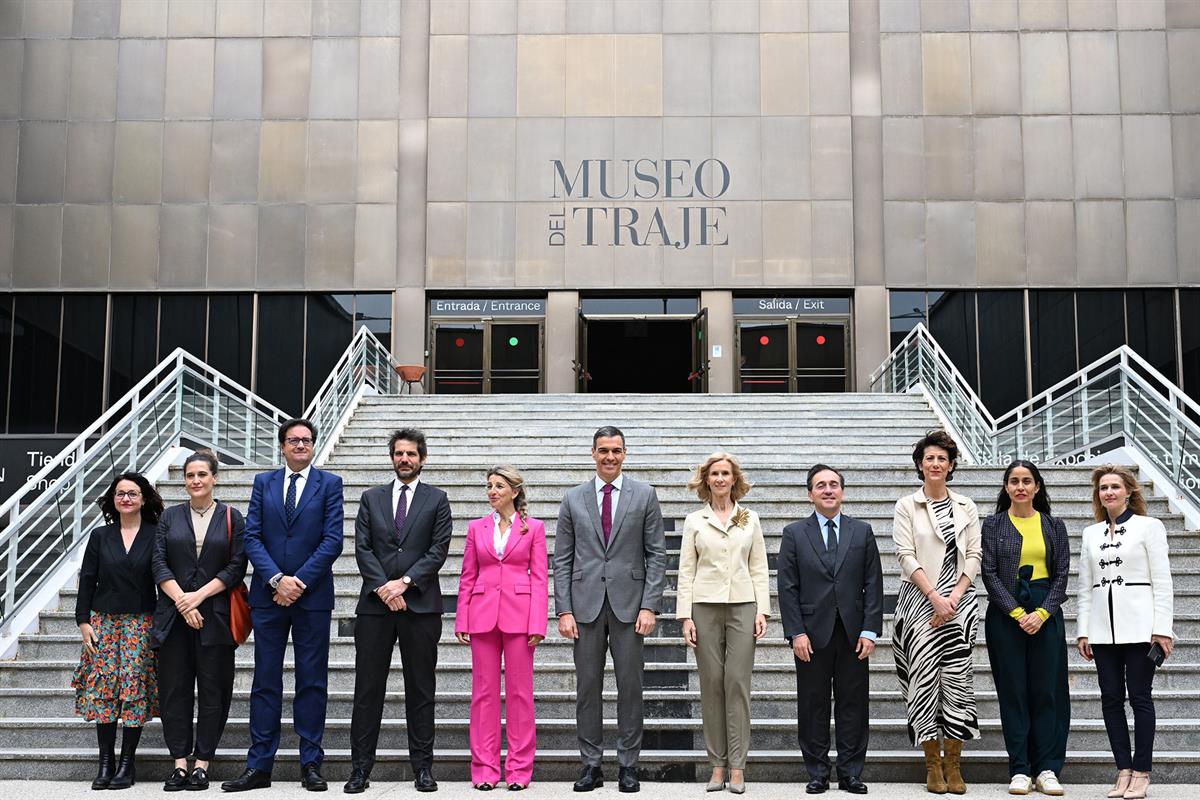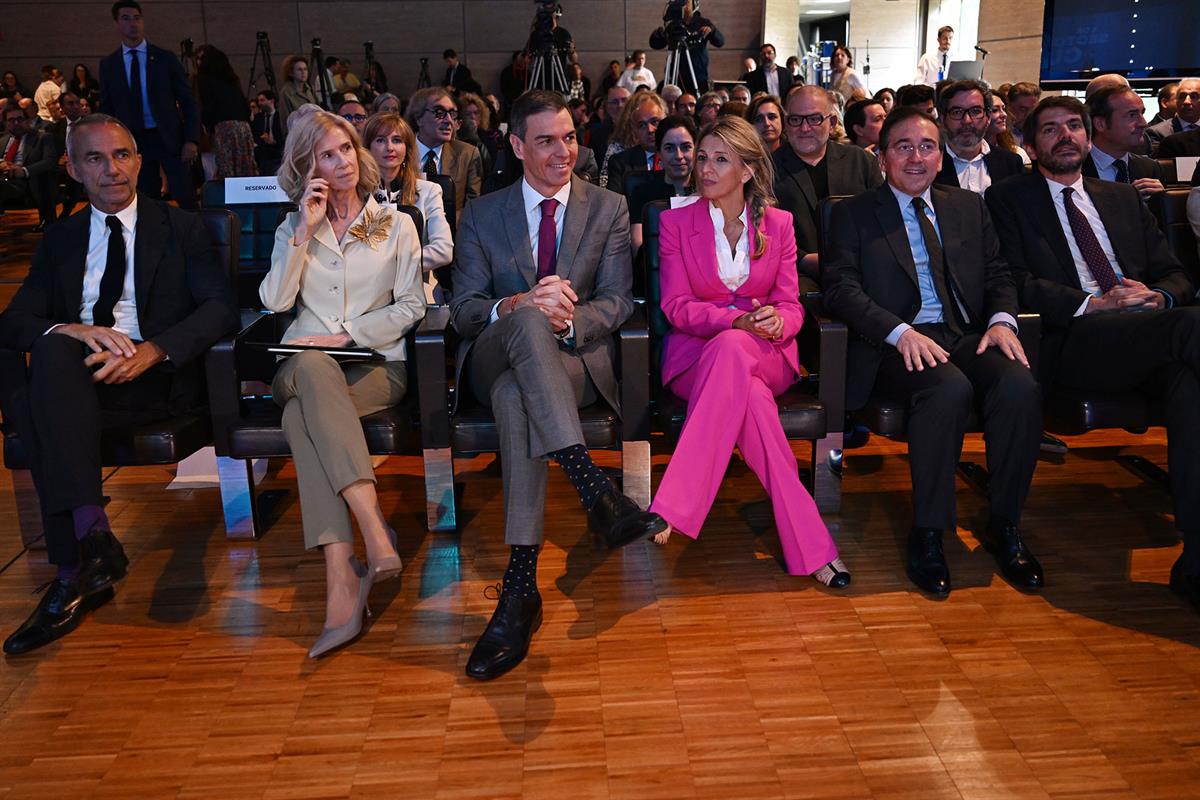Presentation of the Cotec Foundation report
Pedro Sánchez announces strategic measures to strengthen the internationalisation of the culture sector
President's News - 2025.5.19
Costume Museum, Madrid
 The President of the Government of Spain, Pedro Sánchez, during his remarks at the closing ceremony of the presentation of the report "The Cultural and Creative Sectors in Spain. Analysis of Their Economic Value," organized by the Cotec Foundation (Pool Moncloa / José Manuel Álvarez)
The President of the Government of Spain, Pedro Sánchez, during his remarks at the closing ceremony of the presentation of the report "The Cultural and Creative Sectors in Spain. Analysis of Their Economic Value," organized by the Cotec Foundation (Pool Moncloa / José Manuel Álvarez)
The President of the Government of Spain, Pedro Sánchez, announced a series of strategic measures to strengthen the internationalisation of the Spanish cultural sector, and stressed that culture "is not an expense", but "an investment in the future". The announcement was made during the closing ceremony of the presentation of the report 'The cultural and creative sectors in Spain. Analysis of their economic value', produced by the Cotec Foundation with the support of the Daniel and Nina Carasso Foundation, and held at the Museo del Traje in Madrid. The event was attended by the Second Vice-President of the Government of Spain and Minister for Work and Social Economy, Yolanda Díaz; the Minister for Foreign Affairs, European Union and Cooperation, José Manuel Albares; the Minister for Culture, Ernest Urtasun; the Minister for Inclusion, Social Security and Migration, Elma Saiz, and the Minister for Digital Transformation and Public Function, Óscar López.
Pedro Sánchez said that culture helps to "build bridges between societies and defend the values we believe in", and that "those who use culture to defend democracy, demand quality public services, denounce sexist behaviour, demand a commitment to the environment, or call for an end to war, whether in Ukraine or Palestine, are right". He argued that "Spain's commitment to international law and human rights must be constant and coherent, including in Europe". For this reason, he said that just as "no one raised their hands to their heads when Russia's invasion of Ukraine began three years ago and it was demanded that Russia withdraw from international competitions and was banned from participating in Eurovision, and the same should go for Israel", because "we cannot allow double standards, not even in culture". In any case, he sent "an embrace of solidarity to the people of Ukraine and Palestine, who are experiencing the senselessness of war and bombing".
Sánchez stated that culture is "essential for a country" as it is "a source of identity, well-being and social cohesion", but it is also "a strategic asset for Spain" and an "essential economic engine for our country", which "enjoys extraordinary economic dynamism". He referred to the improved forecasts announced today by the European Commission, which "joins many other organisations, such as the IMF, which place Spain as one of the very few developed economies in the context of the trade war that will experience sound growth in the coming years, 2.6% in 2025 and 2% in 2026, and forecasts a growth in employment that will place the unemployment rate in Spain below 10% in 2026, one of the main objectives of any government".
As the Cotec Foundation report reveals, the cultural and creative sectors in Spain, which account for 2.3% of gross value added and employed a record 770,000 people in 2024, are an "essential element of this dynamism and we will work to make it even more so, said Sánchez. However, he regretted that "for many years, some sectors have wanted to create an unfair and mistaken narrative" about Spanish culture by talking about a "subsidised sector, which does not create quality employment, is not profitable or is deprofessionalised". On the contrary, he stressed that for every euro invested in the cultural and creative sectors, the economic return for the economy is up to 1.75 euros, which means "a multiplier effect greater than that of construction and tourism". He therefore called for these sectors to be seen as "one of the great economic opportunities of our time".
 Group photo with the President of the Government of Spain, Pedro Sánchez, several ministers, and attendees at the presentation of the report "The Cultural and Creative Sectors in Spain. Analysis of Their Economic Value." | Pool Moncloa/Borja Puig de la Bellacasa
Group photo with the President of the Government of Spain, Pedro Sánchez, several ministers, and attendees at the presentation of the report "The Cultural and Creative Sectors in Spain. Analysis of Their Economic Value." | Pool Moncloa/Borja Puig de la Bellacasa
In this regard, he referred to the "undeniable dynamism" of employment, as since 2019 these sectors have created jobs at a rate of 17%, more than double the average for the economy. Moreover, one out of every four foreign visitors to Spain is motivated by culture, with the average daily expenditure of the cultural tourist standing 17% higher than the rest. For this reason, the government is promoting cultural tourism to especially benefit areas of the "ill-named empty Spain". In addition, he said, "the cultural and creative sectors are a business hotbed of the highest order", where the number of companies has grown by 12% compared to pre-pandemic figures, reaching a total of 274,000, among others. The Executive has just designed a second phase of the '.Spain Audiovisual hub to mobilise more than 1.7 billion euros of public investment from the 'Next Generation' funds, in order to consolidate the commitment to the audiovisual sector and position it as a strategic sector in the future Strategic Investment Committee.
A raft of measures in view of the "enormous untapped potential".
Nevertheless, Pedro Sánchez explained that the Cotec report data are "a call to action" in view of the "enormous potential still to be tapped". Spain is the fourth cultural power in the world according to the 'Global Soft Power Index'; however, he indicated that "Spain has not yet deployed all its muscle in terms of cultural internationalisation". Exports of cultural goods have grown by more than 5% since 2019, and exports of services have grown by 52%.
In this way, he announced a series of strategic measures to strengthen the internationalisation of Spanish culture. So, the Government will be updating the agreement governing the Plan for Cultural Action Abroad (PACE agreement) between the Ministries of Foreign Affairs and Culture, "taking into account the new geopolitical context and providing it with greater capacity for coordination between organisations, resources and shared objectives, in order to seek more coordinated, efficient and effective action". The Council for Cultural Action Abroad will also be activated, and will meet annually with the participation of the heads of the Ministries of Culture and Foreign Affairs and will be attended by the heads of all the organisations involved, from the Instituto Cervantes, ICEX, AECID and RTVE. He also announced the creation of a consultative body with the participation of the cultural sector, which will advise and evaluate the internationalisation strategy.
New National Plan for Cultural Action Abroad 2025-2028
 The President of the Government of Spain, Pedro Sánchez, and several ministers from his Ejecutive during the closing ceremony of the presentation of the Cotec Foundation report | Pool Moncloa/Borja Puig de la Bellacasa
The President of the Government of Spain, Pedro Sánchez, and several ministers from his Ejecutive during the closing ceremony of the presentation of the Cotec Foundation report | Pool Moncloa/Borja Puig de la Bellacasa
In addition, after the summer, the government will present the National Plan for Cultural Action Abroad 2025-2028, which the competent departments and organisations are already working on, with five key axes to promote the cultural and creative industries with the greatest international projection, such as audiovisual, books, music, dance and video games. Also to "use culture as a tool for diplomacy and cooperation", and to improve the branding of Spanish culture internationally, stepping up the communication of Spanish culture abroad.
In parallel, the role of the Spanish language as a unique global asset will continue to be strengthened through the network of Embassies, Cervantes Institutes, international schools and chambers of commerce, and the ALIA artificial intelligence tool in Spanish, with the co-official languages. Finally, he explained that the structure of Cultural Action abroad will be modernised and adapted to the new requirements of the international context. At the end of the event, Pedro Sánchez argued that "culture is not an ornament: it is the soul of who we are. Culture is not a luxury. It is a necessity, a global public good. It is not an expense: it is an investment in the future. An investment that, as we have seen, more than pays for itself. And it is also a right, to create, to imagine, to be excited together.
Non official translation




